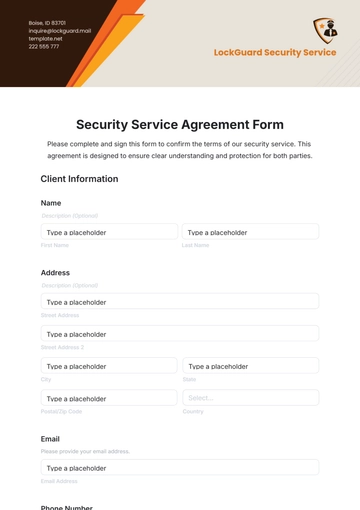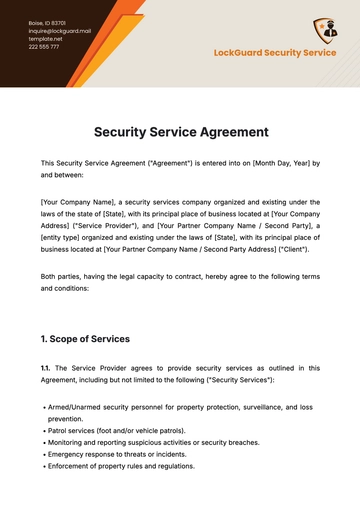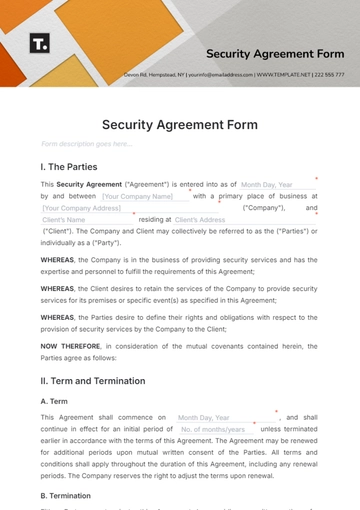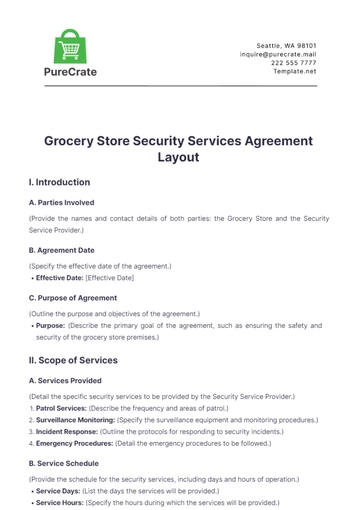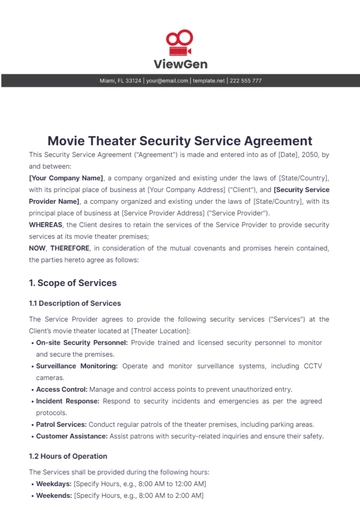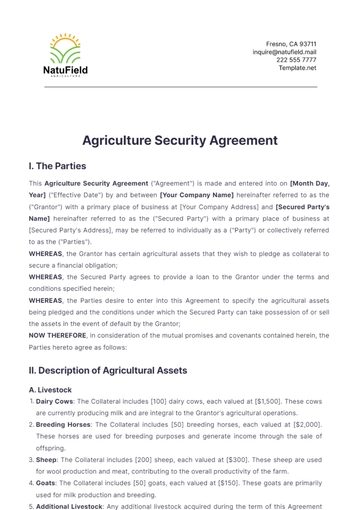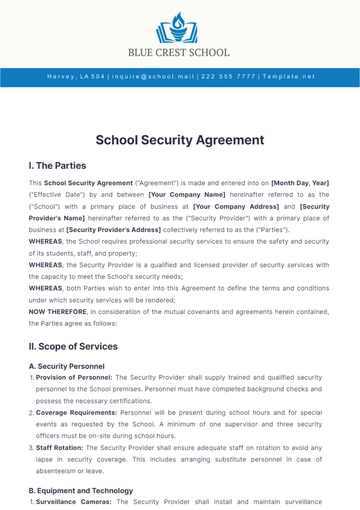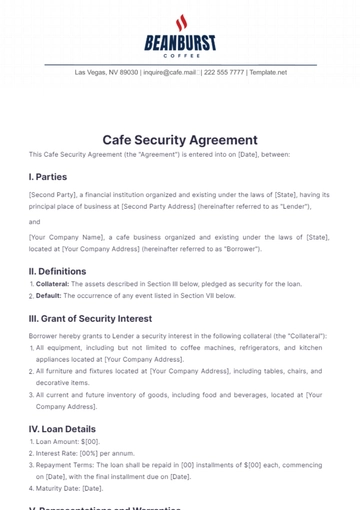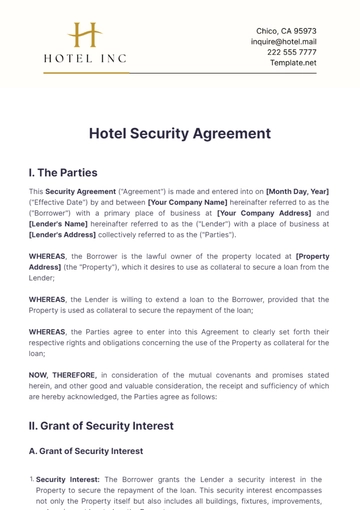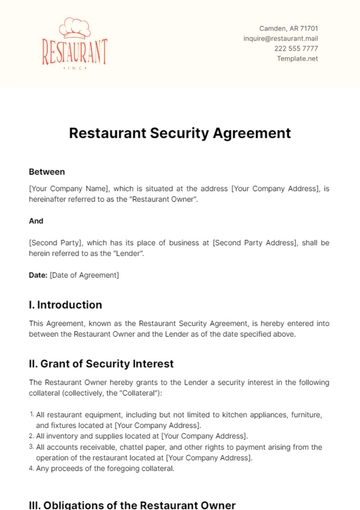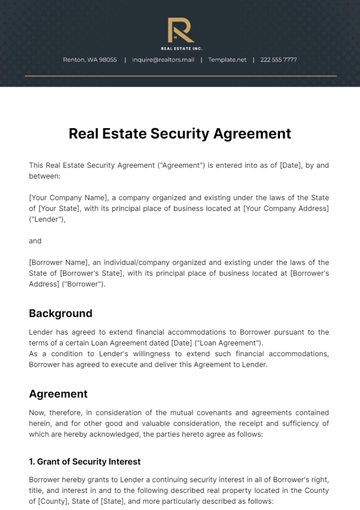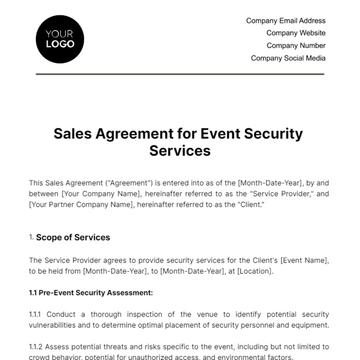Free Agriculture Security Agreement
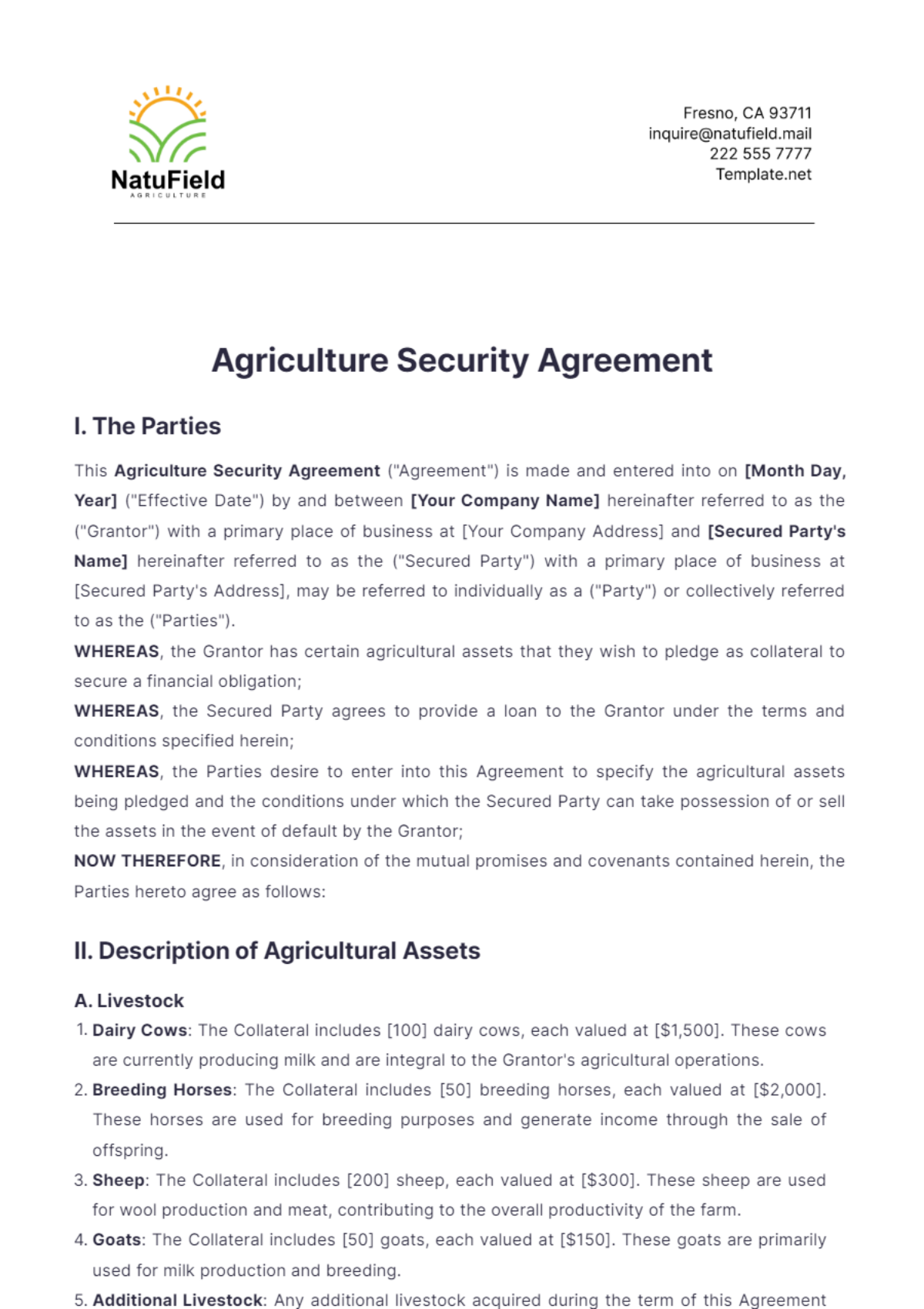
I. The Parties
This Agriculture Security Agreement ("Agreement") is made and entered into on [Month Day, Year] ("Effective Date") by and between [Your Company Name] hereinafter referred to as the ("Grantor") with a primary place of business at [Your Company Address] and [Secured Party's Name] hereinafter referred to as the ("Secured Party") with a primary place of business at [Secured Party's Address], may be referred to individually as a ("Party") or collectively referred to as the ("Parties").
WHEREAS, the Grantor has certain agricultural assets that they wish to pledge as collateral to secure a financial obligation;
WHEREAS, the Secured Party agrees to provide a loan to the Grantor under the terms and conditions specified herein;
WHEREAS, the Parties desire to enter into this Agreement to specify the agricultural assets being pledged and the conditions under which the Secured Party can take possession of or sell the assets in the event of default by the Grantor;
NOW THEREFORE, in consideration of the mutual promises and covenants contained herein, the Parties hereto agree as follows:
II. Description of Agricultural Assets
A. Livestock
Dairy Cows: The Collateral includes [100] dairy cows, each valued at [$1,500]. These cows are currently producing milk and are integral to the Grantor's agricultural operations.
Breeding Horses: The Collateral includes [50] breeding horses, each valued at [$2,000]. These horses are used for breeding purposes and generate income through the sale of offspring.
Sheep: The Collateral includes [200] sheep, each valued at [$300]. These sheep are used for wool production and meat, contributing to the overall productivity of the farm.
Goats: The Collateral includes [50] goats, each valued at [$150]. These goats are primarily used for milk production and breeding.
Additional Livestock: Any additional livestock acquired during the term of this Agreement will automatically be included in the Collateral.
B. Crops
Wheat: The Collateral includes [50] acres of wheat, each acre valued at [$1,200]. The wheat is a primary crop that is expected to be harvested annually.
Corn: The Collateral includes [30] acres of corn, each acre valued at [$1,500]. The corn is used for both direct sale and as feed for livestock.
Soybeans: The Collateral includes [20] acres of soybeans, each acre valued at [$1,000]. The soybeans are a vital crop for rotation and soil health.
Additional Crops: Any additional crops sown or harvested during the term of this Agreement will be included in the Collateral.
C. Equipment
Tractors: The Collateral includes [3] tractors, each valued at [$30,000]. These tractors are essential for plowing, planting, and other agricultural activities.
Combine Harvesters: The Collateral includes [2] combine harvesters, each valued at [$60,000]. These harvesters are critical for the efficient harvesting of crops.
Irrigation Systems: The Collateral includes multiple irrigation systems valued at [$10,000] in total. These systems are vital for ensuring proper water distribution to crops.
Tools and Machinery: The Collateral includes various tools and machinery valued at [$15,000] in total. These tools are necessary for daily farming operations and maintenance.
Additional Equipment: Any additional equipment acquired during the term of this Agreement will automatically be included in the Collateral.
III. Obligations of the Grantor
A. Payment Obligations
Loan Repayment: The Grantor agrees to repay the principal loan amount of [$500,000] along with an annual interest rate of [5]% as scheduled. This includes making regular monthly payments to ensure the loan is paid off within the specified term.
Monthly Payments: Monthly payments must be made by the [15th] of each month. This ensures timely repayment and helps avoid additional fees or penalties.
Late Payment Fee: Late payments will incur an additional fee of [$100] per day. This fee encourages timely payments and helps compensate the Secured Party for delays.
Full Repayment: Full repayment must be completed within [5] years. This term provides a clear timeline for the Grantor to fulfill their financial obligation.
Penalty for Delays: Any delays in payment beyond the stipulated date will attract a penalty, emphasizing the importance of adhering to the payment schedule.
B. Maintenance of Collateral
Equipment Maintenance: The Grantor agrees to keep all farming equipment in good working condition. Regular servicing and repairs are necessary to maintain efficiency and productivity.
Crop Care: The Grantor ensures that all crops are properly irrigated and fertilized. This involves regular monitoring and application of necessary nutrients to ensure healthy growth.
Livestock Health: Regular inspections of livestock for health and welfare are mandatory. This includes vaccinations, feeding, and proper housing to prevent diseases and ensure productivity.
Record Keeping: The Grantor must maintain accurate records of all agricultural activities. These records are essential for tracking operations and providing transparency to the Secured Party.
Preventive Measures: The Grantor shall implement preventive measures to avoid damage or loss to the Collateral, ensuring its longevity and productivity.
C. Insurance Requirements
Comprehensive Insurance: The Grantor agrees to insure all Collateral with comprehensive agricultural insurance. This insurance must cover various risks including natural disasters, theft, and vandalism.
Additional Insured: The insurance policy must list the Secured Party as an additional insured entity. This provides an added layer of security for the Secured Party.
Minimum Coverage: The policy must provide a minimum coverage of [$1,000,000]. This ensures sufficient protection against potential losses.
Continuous Coverage: The insurance must be maintained through the entire duration of the Agreement. Any lapse in coverage can result in a breach of the Agreement.
Proof of Insurance: The Grantor must provide proof of insurance to the Secured Party upon request, ensuring transparency and compliance with the Agreement terms.
IV. Rights of the Secured Party
A. Right to Inspect
Inspection Notice: The Secured Party holds the right to inspect the Collateral with a [48]-hour prior notice to the Grantor. This ensures the Grantor is aware and prepared for the inspection.
Business Hours Inspection: Inspections will be conducted during reasonable business hours. This minimizes disruption to the Grantor's operations.
Expert Evaluations: The Secured Party may bring experts to evaluate the condition of the Collateral. These evaluations ensure the Collateral is being maintained as per the Agreement terms.
Regular Inspections: The Secured Party is entitled to conduct regular inspections to monitor the status of the Collateral.
Report Findings: Any findings from inspections must be documented and reported to the Grantor for necessary actions.
B. Right to Possess
Notice of Default: In the event of a Default, the Secured Party may take possession of the Collateral after serving a written notice of Default to the Grantor. This notice provides a [30]-day period for the Grantor to rectify the Default.
Immediate Possession: If the Default is not rectified within the specified period, the Secured Party may take immediate possession of the Collateral. This action helps secure the interests of the Secured Party.
Reasonable Force: The Secured Party may use necessary and reasonable force to take possession if required. This ensures the Secured Party can effectively reclaim the Collateral.
Additional Expenses: The Grantor will be liable for any additional expenses incurred during the possession process. This includes costs related to transportation, storage, and legal fees.
Collateral Security: Possessing the Collateral provides the Secured Party with security against the outstanding financial obligation.
C. Right to Sell
Sale of Collateral: The Secured Party has the right to sell the Collateral in the event of a Default. This helps recover the outstanding loan amount.
Fair Market Value: The Collateral must be sold at a fair market value. This ensures the sale is conducted ethically and the Grantor receives a reasonable value.
Notice of Sale: The Secured Party must provide a [30]-day notice to the Grantor before selling the Collateral. This notice gives the Grantor an opportunity to rectify the Default or make alternative arrangements.
Proceeds Distribution: The proceeds from the sale will be used to cover the outstanding loan amount and any additional expenses. Any remaining balance will be returned to the Grantor.
Sale Records: Detailed records of the sale must be maintained and shared with the Grantor for transparency.
V. Use and Restrictions of the Collateral
A. Permissible Use
Agricultural Operations: The Grantor may use the Collateral for normal agricultural activities. This includes planting, harvesting, and managing livestock as per standard farming practices.
Livestock Relocation: The Grantor may temporarily relocate livestock for grazing purposes. This helps ensure the health and productivity of the livestock.
Crop Sales: The Grantor is permitted to harvest and sell crops within the legal market. This generates income to support the agricultural operations and loan repayment.
Maintenance Activities: The Grantor can use the Collateral for necessary maintenance activities. This includes repairs and upgrades to farming equipment.
Improvement Projects: The Grantor may undertake projects to improve the Collateral, provided these improvements enhance the overall value and productivity.
B. Restricted Use
Sale or Lease: The Grantor cannot sell or lease any part of the Collateral without written consent from the Secured Party. This ensures the Collateral remains intact and secures the loan.
Illegal Activities: The Collateral cannot be used for illegal activities. This includes any actions that violate local, state, or federal laws.
Neglect of Practices: The Grantor must not neglect essential farming practices. Proper care and management of the Collateral are mandatory to maintain its value.
Value Diminishment: The Grantor cannot take any actions that would significantly diminish the value of the Collateral. This includes activities that could lead to damage or devaluation.
Unapproved Changes: Any significant changes to the use or condition of the Collateral must be approved by the Secured Party. This ensures that the Collateral remains suitable as security for the loan.
VI. Conditions of Default
A. Payment Default
Missed Payments: A payment default occurs if the Grantor fails to make the scheduled monthly payments by the [15th] of each month. Timely payments are crucial for maintaining the Agreement.
Late Fee Non-Payment: Failure to pay the late fee within [15] days after the notice of late payment constitutes a Default. This reinforces the importance of adhering to the payment schedule.
Invalid Payment Methods: Issuance of a bounced check or any other invalid payment method will result in a payment default. Reliable payment methods are essential for fulfilling financial obligations.
Repeated Delays: Consistent delays in making payments can also trigger a payment default, highlighting the need for punctuality.
Non-compliance with Repayment Plan: Any deviation from the agreed repayment plan without prior approval from the Secured Party is considered a payment default.
B. Maintenance Default
Equipment Neglect: A maintenance default occurs if the Grantor fails to maintain the Collateral in good working condition. Proper maintenance ensures the Collateral retains its value and functionality.
Livestock Welfare: Ignoring or failing to conduct regular inspections of livestock results in a maintenance default. The health and welfare of livestock are critical for agricultural productivity.
Record Keeping Lapses: Not keeping accurate records of agricultural activities constitutes a maintenance default. Detailed records provide transparency and track the progress of operations.
Insurance Neglect: Neglecting the insurance requirements as outlined in this Agreement will result in a maintenance default. Insurance is crucial for protecting the Collateral against unforeseen risks.
Failure to Address Issues: Any failure to address identified issues with the Collateral in a timely manner is considered a maintenance default.
VII. Insurance
A. Types of Insurance
Comprehensive Agricultural Insurance: The Grantor must obtain comprehensive agricultural insurance covering all risks. This includes protection against natural disasters, theft, and vandalism.
Liability Insurance: The Grantor must secure liability insurance to cover injuries or damages caused by livestock or farming operations. This insurance provides coverage for legal liabilities.
Property Insurance: The Grantor must obtain property insurance covering all equipment against fire, theft, and vandalism. This ensures the equipment is protected from potential losses.
Flood Insurance: If the farm is located in a flood-prone area, the Grantor must obtain flood insurance. This insurance provides coverage against flood-related damages.
Additional Coverage: The Grantor may consider additional insurance coverage based on specific needs and risks associated with their agricultural operations.
B. Insurance Policy Terms
Continuous Coverage: The insurance policies must be maintained for the entire duration of this Agreement. This ensures uninterrupted protection for the Collateral.
Secured Party as Insured: The policies must name the Secured Party as an additional insured entity. This provides the Secured Party with a direct interest in the insurance coverage.
Notice of Policy Changes: Policies cannot be modified or cancelled without at least [30] days' prior written notice to the Secured Party. This ensures the Secured Party is aware of any changes.
Proof of Insurance: The Grantor must provide proof of insurance to the Secured Party upon request. This includes copies of policy documents and proof of premium payments.
Minimum Coverage Amounts: The policies must meet or exceed the minimum coverage amounts specified in this Agreement, ensuring adequate protection.
C. Claims and Settlements
Claim Notification: The Grantor must notify the Secured Party immediately upon filing an insurance claim related to the Collateral. This ensures the Secured Party is aware of potential changes to the Collateral’s value.
Settlement Proceeds: Any insurance settlement proceeds must be used to repair or replace the damaged Collateral or to repay the outstanding loan amount, as agreed by both Parties.
Claims Management: The Grantor is responsible for managing insurance claims efficiently and in good faith, ensuring timely resolution and proper use of settlement funds.
Documentation of Claims: The Grantor must provide the Secured Party with all relevant documentation related to the insurance claims, including claim forms, correspondence, and settlement agreements.
Dispute Resolution: Any disputes regarding insurance claims or settlements must be resolved in accordance with the dispute resolution process outlined in this Agreement.
VIII. Termination
A. Grounds for Termination
Fulfillment of Obligations: This Agreement may be terminated upon the fulfillment of all payment obligations and terms by the Grantor. This indicates that the loan has been fully repaid and all conditions have been met.
Mutual Agreement: The Agreement may be terminated by mutual agreement between the Parties. This provides flexibility for both Parties to end the Agreement if both find it beneficial.
Default Notice: The Secured Party may terminate the Agreement upon written notice of Default to the Grantor. This step is taken when the Grantor fails to rectify a Default within the specified period.
Material Breach: Any material breach of the terms and conditions by either Party can be grounds for termination, ensuring adherence to the Agreement.
Force Majeure: Prolonged force majeure events that prevent either Party from fulfilling their obligations can also lead to termination of the Agreement.
B. Effect of Termination
Immediate Payments: Upon termination, any unpaid amounts become immediately due and payable. This ensures that the Secured Party recovers the outstanding loan amount.
Return of Collateral: The Grantor must return any remaining Collateral to the Secured Party. This helps the Secured Party recover assets pledged as security.
Release of Obligations: Both Parties agree to release each other from any further obligations under this Agreement. This finalizes the termination and closes any outstanding responsibilities.
Settlement of Accounts: A final settlement of accounts must be conducted to ensure all financial matters are resolved.
Legal Actions: Any legal actions related to the termination must be handled in accordance with the governing law and dispute resolution sections of this Agreement.
IX. Amendments and Waivers
A. Amendments
Written Amendments: No amendment or modification of this Agreement shall be valid unless in writing and signed by both Parties. This ensures that any changes are formally documented and agreed upon.
Mutual Consent: Any amendments must be made with the mutual consent of both Parties. This maintains the balance and fairness of the Agreement.
Documentation: All amendments must be documented and attached to the original Agreement. This provides a clear record of any changes made.
No Implied Amendments: No verbal agreements or informal communications shall be considered as amendments. All changes must follow the formal amendment process.
Review Process: Any proposed amendments should be reviewed by legal advisors of both Parties to ensure compliance and protect interests.
B. Waivers
Written Waivers: Any waiver of any term or condition of this Agreement shall not be effective unless in writing and signed by the waiving Party. This ensures that waivers are formally acknowledged and agreed upon.
Single Occurrence: A waiver on one occasion shall not be deemed a waiver of the same or any other term or condition on any other occasion. This maintains the integrity of the Agreement terms.
Non-Waiver of Rights: No failure or delay by either Party in exercising any right, power, or privilege under this Agreement shall operate as a waiver thereof. This preserves the rights of both Parties.
Partial Exercise: No single or partial exercise of any right, power, or privilege shall preclude any other or further exercise thereof. This ensures that the Parties can fully exercise their rights as needed.
Effectiveness of Waivers: All waivers must be executed effectively to ensure they are legally binding and recognized.
X. Miscellaneous
A. Governing Law
Applicable Law: This Agreement shall be governed by and construed in accordance with the laws of the State of [State Name]. This establishes the legal framework for interpreting and enforcing the Agreement.
Jurisdiction: Any legal action arising from this Agreement will be subject to the jurisdiction of [State Name]. This provides clarity on the legal venue for resolving disputes.
Court Submission: Both Parties agree to submit to the jurisdiction of the courts in [State Name]. This ensures a clear process for handling legal disputes.
Conflict of Laws: Any conflicts between laws will be resolved under the principles of [State Name]. This ensures consistency and fairness in legal interpretations.
Legal Compliance: Both Parties must comply with all applicable laws and regulations of [State Name] throughout the term of this Agreement.
B. Dispute Resolution
Negotiation and Mediation: Any dispute arising under this Agreement shall be resolved through negotiation and mediation between the Parties. This encourages an amicable resolution without resorting to litigation.
Binding Arbitration: In the absence of a resolution, the dispute shall be escalated to binding arbitration under the rules of the [American Arbitration Association]. This provides a structured and impartial process for resolving disputes.
Arbitration Venue: The venue for arbitration shall be [State Name]. This ensures that arbitration proceedings are conducted in a familiar and accessible location for both Parties.
Arbitration Costs: The costs of arbitration, including attorneys' fees, shall be borne by the losing Party unless otherwise awarded by the arbitrator. This encourages fair and efficient resolution of disputes.
Final Decision: The arbitrator's decision shall be final and binding on both Parties. This provides a definitive resolution to disputes.
C. Notices
Written Communications: All notices, requests, demands, and other communications hereunder shall be in writing. This ensures clarity and documentation of all important communications.
Delivery Methods: Notices shall be deemed to have been duly given if delivered by hand, sent by registered or certified mail, return receipt requested, or by recognized overnight delivery service. This provides reliable methods for ensuring receipt of notices.
Addresses for Notices: Notices shall be sent to the respective Parties at the addresses first above written. This provides a clear and consistent point of contact for all communications.
Acknowledgment of Receipt: The receiving Party must acknowledge receipt of the notice. This confirms that the notice has been received and read.
Change of Address: Any change of address for the purpose of notice must be communicated in writing to the other Party. This ensures that both Parties are aware of the correct addresses for future communications.
D. Entire Agreement
Complete Agreement: This Agreement constitutes the entire agreement between the Parties with respect to the subject matter hereof. This ensures that all terms and conditions are fully documented and agreed upon.
Superseding Clause: It supersedes all prior and contemporaneous agreements, representations, and understandings of the Parties. This prevents any conflicting or outdated agreements from affecting the current Agreement.
No Oral Modifications: No oral modifications to this Agreement are allowed. All changes must be documented and agreed upon in writing.
Incorporation of Exhibits: Any exhibits or attachments referenced in this Agreement are incorporated herein by reference. This ensures that all relevant documents are part of the Agreement.
Severability: If any provision of this Agreement is found to be invalid or unenforceable, the remaining provisions shall remain in full force and effect. This ensures the Agreement remains functional even if part of it is invalidated.
XI. Signatures
IN WITNESS WHEREOF, the Parties hereto have executed this Agreement as of the Effective Date.
Grantor

[Authorized Representative Name]
[Your Company Name]
Date: [Month Day, Year]
Secured Party

[Authorized Representative Name]
[Secured Party's Name]
Date: [Month Day, Year]
- 100% Customizable, free editor
- Access 1 Million+ Templates, photo’s & graphics
- Download or share as a template
- Click and replace photos, graphics, text, backgrounds
- Resize, crop, AI write & more
- Access advanced editor
Secure assets with our Agriculture Security Agreement Template from Template.net! This template includes editable sections to tailor the agreement to your needs. Customizable fields allow for the inclusion of your business branding. The AI Editor Tool ensures efficient and accurate creation, providing a comprehensive security agreement for your agricultural operations!
You may also like
- Lease Agreement
- Non Compete Agreement
- Rental Agreement
- Prenuptial Agreement
- Non Disclosure Agreement
- Operating Agreement
- Hold Harmless Agreement
- LLC Operating Agreement
- Arbitration Agreement
- Purchase Agreement
- Residential Lease Agreement
- Executive Agreement
- Confidentiality Agreement
- Contractor Agreement
- Partnership Agreement
- Postnuptial Agreement
- Collective Bargaining Agreement
- Loan Agreement
- Roommate Agreement
- Commercial Lease Agreement
- Separation Agreement
- Cohabitation Agreement
- Room Rental Agreement
- Child Custody Agreement
- Employee Agreement
- License Agreements
- Settlement Agreement
- Joint Venture Agreement
- Indemnity Agreement
- Subordination Agreement
- Sales Agreement
- Agreements Between Two Parties
- Business Agreement
- Real Estate Agreement
- HR Agreement
- Service Agreement
- Property Agreement
- Agreement Letter
- Restaurant Agreement
- Construction Agreement
- Finance Agreement
- Marketing Agreement
- Payment Agreement
- Investment Agreement
- Management Agreement
- Nonprofit Agreement
- Software Agreement
- Startup Agreement
- Agency Agreement
- Copyright Agreement
- Collaboration Agreement
- Reseller Agreement
- Car Rental Agreement
- Cleaning Services Agreement
- Consultant Agreement
- Deed Agreement
- Car Agreement
- Equipment Agreement
- Shares Agreement
- Data Sharing Agreement
- Advertising Agreement
- School Agreement
- Franchise Agreement
- Event Agreement
- Travel Agency Agreement
- Vehicle Agreement
- Board Resolution Agreement
- Land Agreement
- Binding Agreement
- Tenancy Agreement
- Exclusive Agreement
- Development Agreement
- Assignment Agreement
- Design Agreement
- Equity Agreement
- Mortgage Agreement
- Purchase and Sale Agreement
- Shareholder Agreement
- Vendor Agreement
- Royalty Agreement
- Vehicle Lease Agreement
- Hotel Agreement
- Tenant Agreement
- Artist Agreement
- Commission Agreement
- Consignment Agreement
- Debt Agreement
- Recruitment Agreement
- Training Agreement
- Transfer Agreement
- Apprenticeship Agreement
- IT and Software Agreement
- Referral Agreement
- Resolution Agreement
- Waiver Agreement
- Consent Agreement
- Partner Agreement
- Social Media Agreement
- Customer Agreement
- Credit Agreement
- Supply Agreement
- Agent Agreement
- Brand Agreement
- Law Firm Agreement
- Maintenance Agreement
- Mutual Agreement
- Retail Agreement
- Deposit Agreement
- Land Purchase Agreement
- Nursing Home Agreement
- Supplier Agreement
- Buy Sell Agreement
- Child Support Agreement
- Landlord Agreement
- Payment Plan Agreement
- Release Agreement
- Research Agreement
- Sponsorship Agreement
- Buyout Agreement
- Equipment Rental Agreement
- Farm Agreement
- Manufacturing Agreement
- Strategic Agreement
- Termination of Lease Agreement
- Compliance Agreement
- Family Agreement
- Interior Design Agreement
- Ownership Agreement
- Residential Lease Agreement
- Retainer Agreement
- Trade Agreement
- University Agreement
- Broker Agreement
- Dissolution Agreement
- Funding Agreement
- Hosting Agreement
- Investor Agreement
- Memorandum of Agreement
- Advisory Agreement
- Affiliate Agreement
- Freelancer Agreement
- Grant Agreement
- Master Service Agreement
- Parking Agreement
- Subscription Agreement
- Trust Agreement
- Cancellation Agreement
- Horse Agreement
- Influencer Agreement
- Membership Agreement
- Vacation Rental Agreement
- Wholesale Agreement
- Author Agreement
- Distributor Agreement
- Exchange Agreement
- Food Agreement
- Guarantee Agreement
- Installment Agreement
- Internship Agreement
- Music Agreement
- Severance Agreement
- Software Development Agreement
- Storage Agreement
- Facility Agreement
- Intercompany Agreement
- Lending Agreement
- Lodger Agreement
- Outsourcing Services Agreement
- Usage Agreement
- Assurance Agreement
- Photography Agreement
- Profit Sharing Agreement
- Relationship Agreement
- Rent To Own Agreement
- Repayment Agreement
- Volunteer Agreement
- Co Parenting Agreement
- HVAC Agreement
- Lawn Care Agreement
- SAAS Agreement
- Work from Home Agreement
- Coaching Agreement
- Protection Agreement
- Security Agreement
- Repair Agreement
- Agreements License
